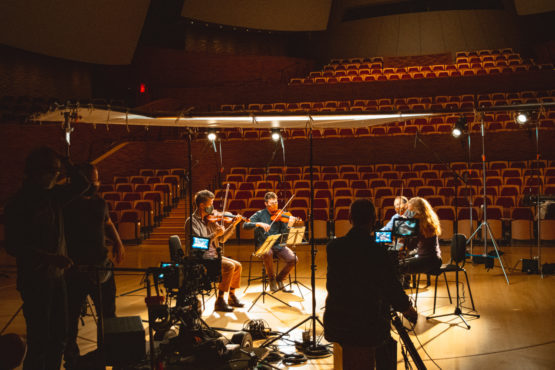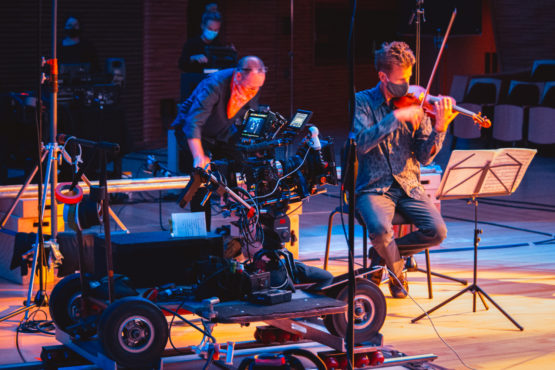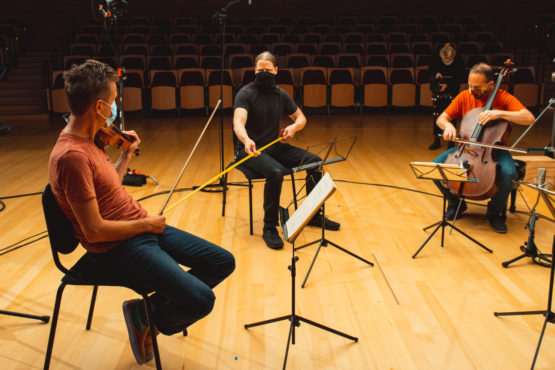Stanford Live opens the fall season with an original documentary featuring the St. Lawrence String Quartet
The first event is a documentary about rehearsing during quarantine and performing in an empty hall with cameras instead of a live audience.
On Sept. 27, Stanford Live will kick off its season in the usual way: Executive Director Chris Lorway will welcome the audience and then take a seat to enjoy the performance. Except, this year, instead of gathering in Bing Concert Hall, the audience will be in their homes tuning in to a digital event, settling into couches and chairs and enjoying the offerings of Stanford Live from a new vantage point.

The St. Lawrence String Quartet plays Haydn’s String Quartet Op. 76 No. 5 and members of the Stanford Live production team and Professor Jamie Meltzer’s camera capture the performance (Image credit: Kimberly Pross)
“Like everybody else, we had to pivot relatively quickly due to COVID-19,” Lorway said. “Not only did we lose our spring and summer but also our in-person fall season. We had to figure out ways to support artists and keep our relationship and connection to our audience even if we couldn’t present concerts in person.”
Lorway and his team have spent the summer building a digital season that does just that. It kicks off with a documentary video that is a collaboration between Stanford Live, Jamie Meltzer, associate professor and director of the MFA Program in Documentary Film in the School of Humanities and Sciences, the St. Lawrence String Quartet (SLSQ), the university’s ensemble-in-residence, and renowned digital arts producer Elena Park. The opening digital concert, a full performance of Haydn’s Op. 76, No. 5, performed to an empty Bing Concert Hall in early September, was captured in the documentary that tells the story of how the SLSQ ended five months of quarantine to prepare their first concert since the pandemic.
Access to the digital season will be free for all currently enrolled Stanford students and Stanford Live members at the $100 Patron level or above. Stanford Live membership at the $100 Patron level gives donors access to the digital season, a subscription to the Stanford Live magazine and complimentary ticket exchanges. Click here to see a short clip from the film.

Violinist Geoff Nuttall warms up while members of the Stanford Live production team test the recording equipment for the St. Lawrence String Quartet performance in Bing Concert Hall. (Image credit: Kimberly Pross)
Meltzer describes the video as a window into the SLSQ’s creative process under the unprecedented constraints of COVID-19. It explores what it means to communicate and connect with one another in a time when gathering in a concert hall, or even the SLSQ’s usual cozy rehearsal studio, is dangerous. Meltzer noted, “documentary filmmakers have been struggling with how to connect and create during a time when the very nature of what we do has to be changed and reinvented. The SLSQ is going through the same challenges.”
In April, Lorway introduced the 2020-21 season as “one of hope, not of fact” – hope that it would be possible to present concerts as planned, but with the knowledge that these plans might not be realized. As the summer progressed, the facts made fall 2020 especially challenging. Kim Pross, director of operations and production at Stanford Live, worked to reimagine a video shoot in Bing Concert Hall that limits the number of people involved and their proximity to one another. She and Meltzer worked together under strict county and university guidelines to ensure the safety of everyone present on the shoot.
Meltzer said, “Filmmaking is quite a challenge during COVID-19. While we would normally film all of the rehearsal process ourselves, the SLSQ has been documenting their own rehearsals on smartphones, and we are conducting interviews over Zoom.” Meltzer’s three-camera setup and bare-bone crew comprised one student and one alumna of the MFA program, captured the SLSQ setting up and performing in Bing Concert Hall while keeping the look and feel of a documentary film. “The final product doesn’t pretend to be a ‘perfect’ performance, but rather it shows how the quartet faces these challenges and is able to create music that transcends the moment.”

Egan O’Rourke, production manager for Stanford Live, measures the distance between chairs as to ensure social distancing while violinist Geoff Nuttall and cellist Christopher Costanza of the St. Lawrence String Quartet warm up in Bing Concert Hall. (Image credit: Kimberly Pross)
Audiences will peek behind the curtain and see the SLSQ reunite after the longest hiatus in the ensemble’s 30-year history. Cameras captured them rehearsing with masks in the basement studio of violinist Geoff Nuttall. In Bing, audiences will see the small production crew setting up mics and cameras, hear the banter between musicians and technicians, all in service of the SLSQ’s first performance since the start of the pandemic in March.
Nuttall reflects on the past months away from his colleagues and audiences, “I can’t tell you how much I’ve missed playing and performing with the quartet. It felt great to get together after many months apart. And it was just like riding a bike. Of course, we have masks and are sitting far away from each other, that has added a layer of difficulty, but in many ways, it feels just like it did before.”
Lorway is looking forward to premiering this video and several more, most of which will be filmed in Bing Concert Hall, over the course of the fall. “What we’re trying to create with these films is that sense of intimacy even when you watch the show,” he said. “We start with the SLSQ, who are both the home team and also acclaimed international musicians, and then lay on top of that the expertise of outside producers and a professor in one of the country’s best university documentary film programs, all to make something incredibly special. We are thrilled to be part of a great local artistic community on campus, and we hope that this type of performance will bring our community together and offer hope that there is a way forward for the arts.”
